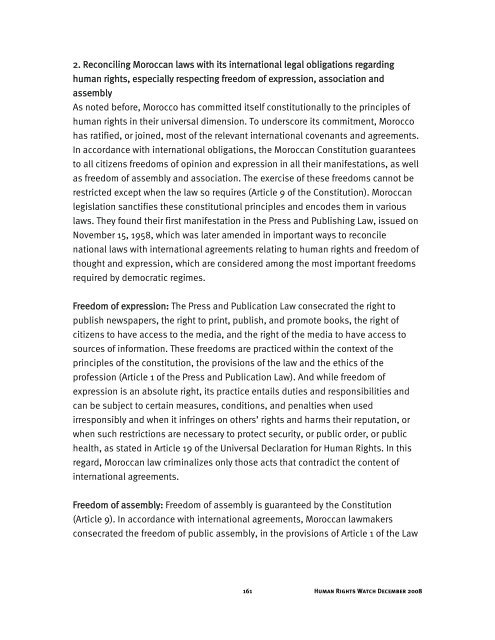Download full report with cover - Human Rights Watch
Download full report with cover - Human Rights Watch
Download full report with cover - Human Rights Watch
You also want an ePaper? Increase the reach of your titles
YUMPU automatically turns print PDFs into web optimized ePapers that Google loves.
2. Reconciling Moroccan laws <strong>with</strong> its international legal obligations regarding<br />
human rights, especially respecting freedom of expression, association and<br />
assembly<br />
As noted before, Morocco has committed itself constitutionally to the principles of<br />
human rights in their universal dimension. To underscore its commitment, Morocco<br />
has ratified, or joined, most of the relevant international covenants and agreements.<br />
In accordance <strong>with</strong> international obligations, the Moroccan Constitution guarantees<br />
to all citizens freedoms of opinion and expression in all their manifestations, as well<br />
as freedom of assembly and association. The exercise of these freedoms cannot be<br />
restricted except when the law so requires (Article 9 of the Constitution). Moroccan<br />
legislation sanctifies these constitutional principles and encodes them in various<br />
laws. They found their first manifestation in the Press and Publishing Law, issued on<br />
November 15, 1958, which was later amended in important ways to reconcile<br />
national laws <strong>with</strong> international agreements relating to human rights and freedom of<br />
thought and expression, which are considered among the most important freedoms<br />
required by democratic regimes.<br />
Freedom of expression: The Press and Publication Law consecrated the right to<br />
publish newspapers, the right to print, publish, and promote books, the right of<br />
citizens to have access to the media, and the right of the media to have access to<br />
sources of information. These freedoms are practiced <strong>with</strong>in the context of the<br />
principles of the constitution, the provisions of the law and the ethics of the<br />
profession (Article 1 of the Press and Publication Law). And while freedom of<br />
expression is an absolute right, its practice entails duties and responsibilities and<br />
can be subject to certain measures, conditions, and penalties when used<br />
irresponsibly and when it infringes on others’ rights and harms their reputation, or<br />
when such restrictions are necessary to protect security, or public order, or public<br />
health, as stated in Article 19 of the Universal Declaration for <strong>Human</strong> <strong>Rights</strong>. In this<br />
regard, Moroccan law criminalizes only those acts that contradict the content of<br />
international agreements.<br />
Freedom of assembly: Freedom of assembly is guaranteed by the Constitution<br />
(Article 9). In accordance <strong>with</strong> international agreements, Moroccan lawmakers<br />
consecrated the freedom of public assembly, in the provisions of Article 1 of the Law<br />
161 <strong>Human</strong> <strong>Rights</strong> <strong>Watch</strong> December 2008


